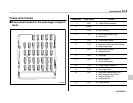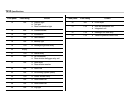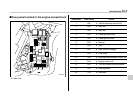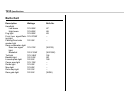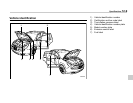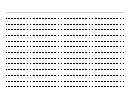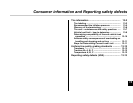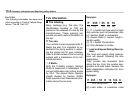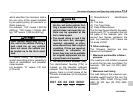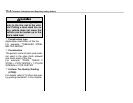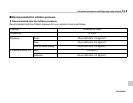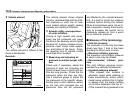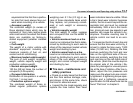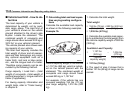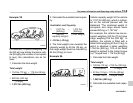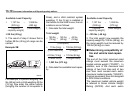
Consumer information and Reporting safety defects 13-3
– CONTINUED –
which specifies the maximum load a
tire can carry at the speed indicated
by its speed symbol, at maximum in-
flation pressure.
For example, “104” means 1,984 lbs
(900 kg), “100” means 1,764 lbs (800
kg), “90” means 1,323 lbs (600 kg)
(7) Speed Rating: An alphabetical
system describing a tire’s capability to
travel at established and predeter-
mined speeds.
For example, “H” means 130 mph
(210 km/h)
T Tire Identification Number (TIN)
Tire Identification Number (TIN) is
marked on the intended outboard
sidewall. The TIN is composed of four
groups. Here is a brief review of the
TIN with a breakdown of its individual
elements.
(1) Manufacturer’s Identification
Mark
(2) Tire Size
(3) Tire Type Code
(4) Date of Manufacture
The first two figures identify the week,
starting with “01” to represent the first
full week of the calendar year; the
second two figures represent the
year. For example, 0101 means the
1st week of 2001.
T Other markings
The following makings are also
placed on the sidewall.
V Maximum permissible inflation
pressure
The maximum cold inflation pressure
to which this tire may be inflated. For
example, “300 kpa (44 PSI) MAX.
PRESS”
V Maximum load rating
The load rating at the maximum per-
missible weight load for this tire. For
example, “MAX. LOAD 730 kg (1609
LBS) @ 300 kpa (44 PSI) MAX.
PRESS.”
Load indices apply only to the
tire, not to the vehicle. Putting a
load rated tire on any vehicle
does not mean the vehicle can
be loaded up to the tire’s rated
load.
y Speed ratings apply only to
the tire, not to the vehicle. Put-
ting a speed rated tire on any
vehicle does not mean the ve-
hicle can be operated at the
tire’s rated speed.
y The speed rating is void if the
tires are worn out, damaged,
repaired, retreaded, or other-
wise altered from their original
condition. If tires are repaired,
retreaded, or otherwise al-
tered, they may not be suitable
for original equipment tire de-
signed loads and speeds.
DOT XX XX XXX XXXX
(1) (2)
(3)
(4)



